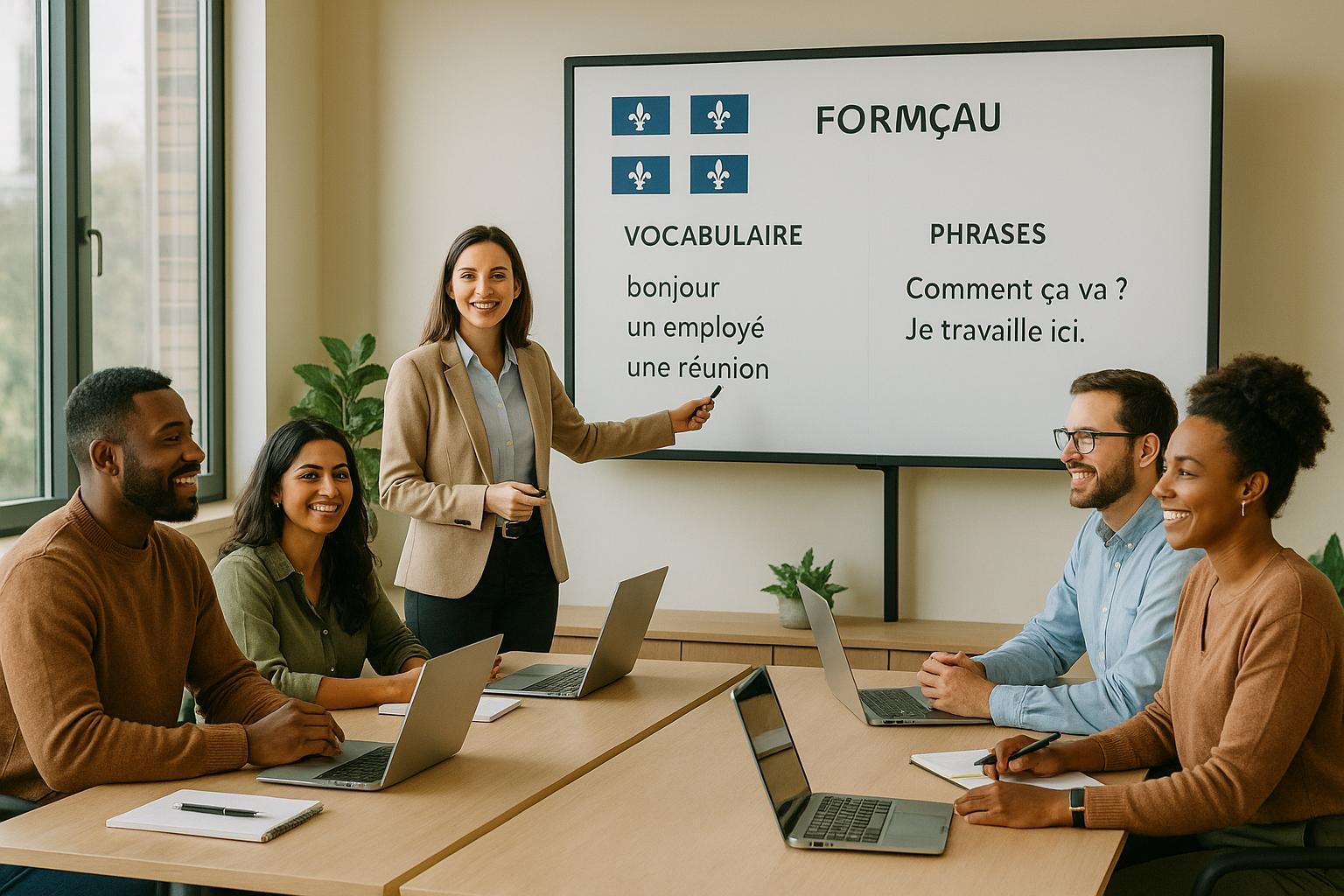How many words do you need to know to work in French in Quebec?
Understand the French language requirements for workplaces in Quebec and how to effectively integrate French into your business operations.

How many words do you need to know to work in French?
In Quebec, working in French isn’t optional - it’s required by law under Bill 96. Compliance ensures businesses avoid hefty fines (up to $30,000 per infraction) while fostering smoother workplace integration. But how much French do you really need to know for work?
Here’s the quick answer:
- Basic roles: 2,000–3,000 common words for greetings, instructions, and team communication.
- Specialized jobs: Industry-specific vocabulary (e.g., medical, legal, or technical terms).
- Compliance: All workplace communication - including emails, contracts, and training materials - must be in French.
AI-powered tools like Francoflex can assist by tailoring French training to job-specific needs and helping businesses meet Quebec’s language laws. Whether you’re an employee or employer, mastering workplace French is now a priority.
Learning French Office Vocabulary: A List For Beginners
How Many French Words Do You Need for Work?
The number of French words you need to know depends largely on your job and the industry you’re in. With Bill 96 in Quebec requiring employees to perform their duties in French, having a solid foundation of workplace vocabulary is crucial. However, your success often hinges on mastering a basic set of words and phrases, which can be expanded as needed.
Setting realistic language goals starts with understanding the specific vocabulary your role demands. Let’s dive into the essentials for both general and specialized workplace communication.
"Workers covered by Quebec laws have the right to work in French. But that isn't to say that people with limited knowledge of French can't work in Quebec. As long as employers respect the following rules about language in the workplace, they can hire those who best fit their organization's needs without facing legal consequences." – Éducaloi [1]
Basic Vocabulary for Workplace Communication
For most entry-level roles, a foundational vocabulary is essential for daily tasks like greetings, following instructions, and participating in routine team interactions. This includes common phrases for social exchanges, simple instructions, and frequently used verbs.
Certain industries, such as finance, insurance, retail, tourism, and hospitality, require employees to learn customer service expressions and terminology specific to their field. These phrases help ensure clear communication with clients and colleagues.
For more specialized roles, expanding beyond basic vocabulary becomes necessary.
Advanced Vocabulary for Professional Jobs
In professions like healthcare, public service, and education, advanced and industry-specific vocabulary is key. Healthcare professionals, for example, need to understand medical terms related to anatomy, symptoms, and patient care. Public service roles often require knowledge of legal and governmental terminology, while educators must be familiar with curriculum-related terms and classroom management phrases.
Statistics highlight the growing importance of French in Canada’s job market. Approximately 7.9% of private sector jobs in the country require bilingualism in French and English, and about 23% of private businesses provide services in both languages [4]. This trend reinforces the need for French proficiency in many workplaces.
Key Vocabulary Categories for Workplace Success
To excel in a French-speaking workplace, it’s essential to focus on three main areas of vocabulary. These categories form the backbone of professional communication and will set you up for success as you navigate workplace interactions and prepare for tools that enhance language integration.
Basic Social Interactions
Building strong professional relationships starts with mastering proper greetings and introductions. In French-speaking workplaces, always begin with the formal "vous" unless invited to switch to "tu" [5][7]. This formality reflects respect and professionalism, which are highly valued.
Key phrases to know include polite greetings like "Bonjour Madame/Monsieur," introductions such as "Je me présente, je suis…," and responses like "Enchanté(e) de vous rencontrer." When answering the phone in a workplace setting, use the company name instead of the casual "Allo?" [7].
Polite small talk is also appreciated. Topics like art, gastronomy, or culture can make a positive impression on colleagues and supervisors [6]. When exchanging business cards, it’s customary to use both hands and take a moment to acknowledge the card thoughtfully [6].
Once you’ve mastered these social cues, the next step is effectively handling workplace instructions.
Workplace Instructions and Procedures
In professional environments, clarity is key. Use straightforward language and strong action verbs to give or follow instructions. This approach ensures that workplace procedures are understood and followed correctly, which is particularly important for adhering to Bill 96 requirements and ensuring smooth OQLF audits.
Common Business Communication Phrases
Written and verbal communication in French business settings follows specific formal conventions. For example, emails typically start with "Madame/Monsieur" and conclude with "Cordialement" [6]. Following these norms helps maintain professionalism and ensures your messages are well-received.
How AI-Powered Tools Can Help with Francisation
AI is reshaping how workplaces approach French language learning. By leveraging AI-driven platforms, businesses can deliver targeted, job-specific French training at a much faster pace. This streamlined approach not only helps organizations meet the requirements of Bill 96 but also equips employees with practical French skills tailored to their daily work tasks.
This technology paves the way for solutions that adapt to individual needs, offering a personalized and scalable approach for employees across various roles.
Personalized Learning Solutions
Francoflex stands out by creating learning plans tailored to each employee's current French proficiency, native language, and specific job responsibilities [8]. The platform identifies gaps in knowledge and focuses on building vocabulary that is directly relevant to each role.
The system evolves dynamically based on individual progress. For instance, a customer service representative will focus on conversational phrases and client-facing vocabulary, while an accountant might concentrate on financial terminology. This ensures employees acquire French skills that are practical and immediately applicable at work.
"Our platform provides AI-driven, flexible French learning solutions. Tailored to your employees' needs & scalable for any business size."
- Francoflex [9]
The AI also takes into account Quebec’s professional norms, teaching employees when and how to use formal language, such as the proper use of "vous", and workplace etiquette. This cultural understanding is essential for smooth integration into Quebec's professional environment.
Scalability for Different Workforce Sizes
Francoflex isn’t just about personalizing learning - it’s built to scale. Whether a business has 1 or 50,000 employees, the platform adapts effortlessly. It also tailors learning to specific departments by focusing on industry-related vocabulary and workplace communication skills necessary for OQLF compliance within six months [9].
This scalability goes beyond numbers. For example, while one department might focus on technical jargon, another could prioritize customer interaction phrases. The AI ensures that all employees, regardless of their role, master the essential communication skills required for compliance.
Progress Tracking and Compliance Reports
To help businesses meet OQLF requirements, Francoflex includes tools to monitor language progress and generate detailed compliance reports [8].
These reports provide insight into employees’ progress toward workplace-level French proficiency. Metrics include performance evaluations, skill assessments, and overall statistics that demonstrate the organization’s efforts in francisation. This data proves invaluable during OQLF audits, showcasing specific improvements and compliance initiatives.
Managers can access real-time updates to see who has mastered key vocabulary, identify employees needing additional support, and track the overall success of the francisation program. With AI monitoring everything from pronunciation improvements to test scores, the platform offers a comprehensive view of language development across the company.
The automatically generated reports save managers significant administrative time while ensuring businesses have the documentation needed to demonstrate compliance with Bill 96. These tools simplify the process of proving francisation efforts, making it easier for organizations to focus on their core operations while meeting regulatory requirements.
Matching Language Skills with OQLF Compliance

Meeting OQLF compliance means ensuring all workplace communications are conducted in French, with penalties for violations reaching up to $30,000 per infraction [17][2]. This strict requirement can make it challenging to adapt general French language skills to meet the specific demands of workplace communication. For instance, an employee might be fluent in conversational French but struggle with the technical terms or formal writing styles required for internal documents.
Understanding OQLF Compliance Requirements
Under Bill 96, businesses with 25 or more employees must primarily operate in French. This includes producing all internal communications and administrative documents in French [10]. Memos, emails, meetings, and official documents must follow this rule, and employees wishing to use another language must make a formal request [10].
Key documents like employment contracts, employee handbooks, HR policies, job postings, workplace guidelines, and safety procedures must all be available in French [10]. Training materials essential for job performance must also be provided in French. If these materials are initially available only in English, businesses must offer a French translation or an equivalent version [10].
Additionally, any digital tools or software used by employees must include a French version if one exists [11].
The OQLF enforces compliance through several methods. Inspectors can visit public-facing business locations during regular hours, review products and documents, make copies, or request specific information from the company [15]. They also investigate complaints, whether submitted by the public or competitors [15].
Steps to Prepare for Compliance Audits
To ensure readiness for OQLF audits, businesses need a structured approach. Companies with 25 or more employees over a six-month period were required to register with the OQLF by June 1, 2025 [12].
Within three months of registration, businesses must conduct a linguistic self-assessment [16]. This review evaluates how well French is integrated into various aspects of operations, such as internal communications, hiring, training, signage, IT systems, and external messaging [14].
Maintaining detailed documentation throughout the francisation process is critical. Centralized glossaries, style guides, and translation workflows help create clear audit trails and demonstrate a commitment to compliance [11]. These records are particularly valuable during OQLF inspections.
If the OQLF determines that French is not sufficiently embedded in the workplace, businesses must develop a francisation program [16]. Companies have three months after registration to complete their linguistic analysis [12].
To streamline translations and avoid inconsistencies, centralize the process [11]. Set up a regular review schedule to update translations and identify new needs [11]. Training your team to recognize what requires translation and when can also be beneficial [11].
"Effective translation management is essential to compliance. It enables organizations to meet regulatory expectations, maintain operational efficiency, and communicate clearly with Quebec's French-speaking community." – Argos Multilingual [11]
Regularly monitor compliance by reviewing business practices, communications, and signage to ensure French remains the dominant language [3]. Proactive monitoring can help catch and address potential issues before they lead to violations.
The consequences of non-compliance can be severe. Fines increase with repeat offences - doubling for a second violation and tripling for subsequent ones [18]. Directors and officers may face personal liability, with fines ranging from $1,400 to $14,000 [18]. Non-compliant companies may also lose access to government programs or public contracts [2]. The OQLF has the authority to issue orders and seek enforcement through the Superior Court of Québec [13].
Conclusion: Key Points for Workplace Francisation
Achieving effective workplace francisation starts with mastering a foundation of 2,000–3,000 essential French words for basic communication. For specialized roles, a more extensive vocabulary is necessary. Training should focus on three core areas: basic social interactions, workplace procedures, and business communication. These skills are increasingly supported by modern tools powered by artificial intelligence.
AI-driven platforms like Francoflex play a crucial role in speeding up the francisation process. These tools provide personalized training that can scale to any workforce size, while also generating compliance reports - an invaluable resource during audits conducted by the Office québécois de la langue française (OQLF).
With the requirements of Bill 96 now in full effect, companies face steep fines and legal risks for failing to meet French language integration standards.
FAQs
What are the language requirements for businesses under Quebec's Bill 96?
Quebec's Bill 96: French as the Priority Language
Quebec's Bill 96 mandates that businesses across all industries and sizes must make French their primary language in daily operations. This includes providing customer service in French, ensuring that French text on signs and advertisements is at least twice as prominent as any other language, and offering official documents - like contracts and manuals - in French. Product labels and packaging must also feature French translations, following specific guidelines for trademarks and descriptive terms.
These rules apply universally to all businesses in Quebec, whether they’re small startups or global corporations. The Office québécois de la langue française (OQLF) is responsible for monitoring compliance and may perform audits to ensure businesses meet these linguistic standards. Aligning with these requirements not only ensures legal compliance but also helps businesses integrate into Quebec's linguistic and cultural landscape.
How can Francoflex help businesses and employees meet Quebec's French language requirements?
Francoflex provides AI-driven solutions designed to help businesses and employees meet Quebec's French language requirements, including those outlined in Bill 96. Its offerings include customized language training, instant vocabulary suggestions tailored for workplace use, and automated tools to assess and monitor progress.
By equipping users with the skills needed for professional-level French, Francoflex ensures seamless workplace integration while meeting legal obligations. It also streamlines the compliance process by producing comprehensive progress reports, helping organizations foster a welcoming, French-speaking work culture.
How can businesses prepare for OQLF audits and ensure compliance with Bill 96?
Preparing for OQLF Audits and Bill 96 Compliance
To meet the requirements of Bill 96 and prepare for OQLF audits, businesses in Quebec should prioritize developing clear workplace language policies that align with the province's French language laws. This includes ensuring that all written communications, signage, and documentation are in French and meet the prescribed legal standards.
Conducting regular internal audits is a smart way to spot and address any compliance issues before they escalate. Offering employees ongoing French language training is another important step. Tools like Francoflex can be particularly useful in boosting workplace proficiency and ensuring your team is well-equipped to meet linguistic expectations.
Finally, consulting with legal or language compliance experts can provide valuable insights and help you navigate the process smoothly, reducing the risk of penalties during audits.






